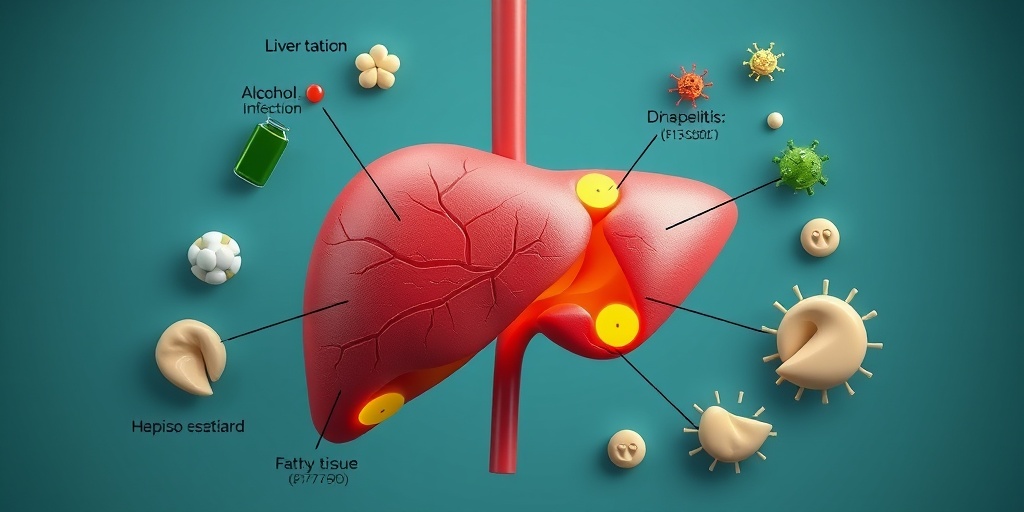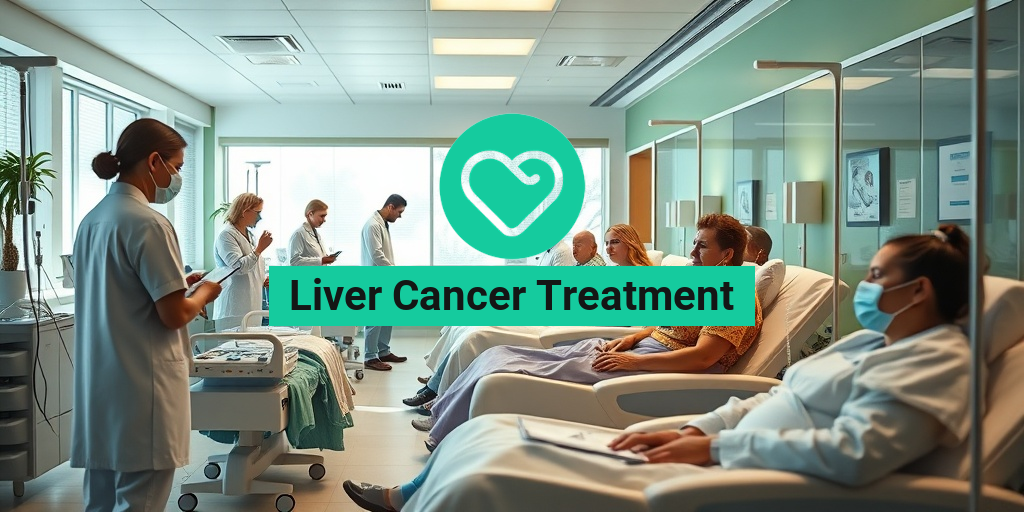What Is Liver Cancer?
Liver cancer, also known as hepatic cancer, is a type of cancer that originates in the liver, one of the body’s vital organs responsible for various functions, including detoxification, protein synthesis, and the production of biochemicals necessary for digestion. The most common form of liver cancer is hepatocellular carcinoma (HCC), which arises from the liver cells (hepatocytes). Understanding liver cancer is crucial for early detection and effective liver cancer treatment.
There are several risk factors associated with liver cancer, including chronic liver diseases such as hepatitis B and C, cirrhosis, excessive alcohol consumption, and obesity. These conditions can lead to liver damage and increase the likelihood of cancer development. In some cases, liver cancer can also occur in individuals without any known risk factors.
Types of Liver Cancer
While HCC is the most prevalent type, liver cancer can also be classified into other forms:
- Cholangiocarcinoma: This cancer originates in the bile ducts and can affect the liver’s ability to function properly.
- Hepatoblastoma: A rare type of liver cancer that primarily affects children, often occurring in infants and young children.
- Secondary Liver Cancer: This occurs when cancer from another part of the body spreads to the liver, making it a secondary site of cancer.
Understanding these types can help in determining the most effective liver cancer treatment options available.
Liver Cancer Symptoms
Recognizing the symptoms of liver cancer is vital for early diagnosis and treatment. Unfortunately, many symptoms may not appear until the cancer is in advanced stages. Here are some common symptoms to watch for:
Common Symptoms
- Unexplained Weight Loss: Sudden weight loss without any changes in diet or exercise can be a significant warning sign.
- Loss of Appetite: A noticeable decrease in appetite can indicate underlying health issues, including liver cancer.
- Abdominal Pain: Persistent pain in the upper right side of the abdomen may signal liver problems.
- Jaundice: Yellowing of the skin and eyes occurs when the liver cannot process bilirubin effectively.
- Fatigue: Chronic fatigue that doesn’t improve with rest can be a symptom of liver cancer.
Advanced Symptoms
As liver cancer progresses, additional symptoms may develop, including:
- Swelling in the Abdomen: Fluid accumulation in the abdomen (ascites) can occur.
- Itchy Skin: Persistent itching can be a result of bile salt accumulation in the bloodstream.
- Confusion or Cognitive Changes: Liver dysfunction can lead to hepatic encephalopathy, affecting mental clarity.
If you experience any of these symptoms, it’s essential to consult a healthcare professional for proper evaluation and diagnosis. Early detection can significantly improve the effectiveness of liver cancer treatment.
Conclusion
Understanding liver cancer and its symptoms is crucial for timely intervention. If you or someone you know is at risk or experiencing symptoms, seeking medical advice is vital. For more information on liver cancer treatment options and resources, consider visiting Yesil Health AI, where you can find evidence-based health answers tailored to your needs. Remember, early detection and treatment can make a significant difference in outcomes! 🌟

Liver Cancer Stages
Liver cancer, also known as hepatocellular carcinoma (HCC), is a serious condition that can progress through various stages. Understanding these stages is crucial for determining the best liver cancer treatment options available. The staging of liver cancer typically follows the TNM system, which assesses the Tumor size, Node involvement, and Metastasis.
Stage 0: Very Early Stage
In this stage, the cancer is not yet visible on imaging tests. It is often referred to as “in situ” cancer, meaning it is confined to the liver and has not spread. Patients may not experience any symptoms, and treatment options may include monitoring or surgical intervention if necessary.
Stage I: Early Stage
At this stage, a single tumor is present, and it has not spread to nearby lymph nodes or distant organs. The tumor is usually less than 2 inches in size. Treatment options may include:
- Surgery: Removal of the tumor or a portion of the liver.
- Liver transplant: Replacing the diseased liver with a healthy one from a donor.
Stage II: Intermediate Stage
Stage II liver cancer may involve one tumor larger than 2 inches or multiple tumors that are still confined to the liver. There may be some involvement of nearby blood vessels. Treatment options can include:
- Radiofrequency ablation: A procedure that uses heat to destroy cancer cells.
- Chemotherapy: Medications that target cancer cells, often used in conjunction with other treatments.
Stage III: Advanced Stage
In this stage, the cancer has spread to nearby lymph nodes or major blood vessels. Patients may experience more pronounced symptoms, and treatment becomes more complex. Options may include:
- Transarterial chemoembolization (TACE): A procedure that delivers chemotherapy directly to the tumor while cutting off its blood supply.
- Targeted therapy: Medications that specifically target cancer cell growth.
Stage IV: Metastatic Stage
Stage IV liver cancer indicates that the cancer has spread to distant organs, such as the lungs or bones. This stage is often associated with a poor prognosis. Treatment options may focus on palliative care to manage symptoms and improve quality of life. Options include:
- Systemic therapy: Chemotherapy or targeted therapy that affects the entire body.
- Clinical trials: Participation in research studies for new treatment options.
Liver Cancer Causes
Understanding the causes of liver cancer is essential for prevention and early detection. Several factors can contribute to the development of this disease, and recognizing them can help individuals make informed health choices.
Chronic Viral Infections
One of the leading causes of liver cancer is chronic infection with hepatitis B or C viruses. These viruses can lead to liver inflammation, cirrhosis, and ultimately cancer. Vaccination against hepatitis B can significantly reduce the risk of developing liver cancer.
Cirrhosis
Cirrhosis, a condition characterized by severe liver scarring, is another major risk factor. It can result from various causes, including:
- Alcohol abuse: Excessive alcohol consumption can lead to liver damage.
- Non-alcoholic fatty liver disease (NAFLD): A condition where fat builds up in the liver, often associated with obesity and diabetes.
Genetic Factors
Certain genetic conditions can increase the risk of liver cancer. For example, hereditary hemochromatosis leads to excessive iron accumulation in the liver, which can cause damage and increase cancer risk. Regular screening and management of these conditions are vital.
Environmental Factors
Exposure to certain toxins and chemicals, such as aflatoxins (produced by mold on crops), can also contribute to liver cancer. Individuals working in industries with high exposure to these substances should take precautions to minimize their risk.
Obesity and Diabetes
Obesity and type 2 diabetes are significant risk factors for liver cancer. Maintaining a healthy weight through diet and exercise can help reduce the risk. A balanced diet rich in fruits, vegetables, and whole grains is essential for liver health.
By understanding the stages and causes of liver cancer, individuals can take proactive steps towards prevention and seek timely treatment options if necessary. Early detection and intervention are key to improving outcomes in liver cancer treatment. 🌟

Liver Cancer Diagnosis
Diagnosing liver cancer can be a complex process, as the symptoms often mimic those of other liver diseases. Early detection is crucial for effective treatment, so understanding the diagnostic methods is essential.
Symptoms to Watch For
Patients may experience a range of symptoms that could indicate liver cancer, including:
- Unexplained weight loss
- Loss of appetite
- Abdominal pain or swelling
- Fatigue
- Jaundice (yellowing of the skin and eyes)
If you notice any of these symptoms, it’s important to consult a healthcare professional for further evaluation.
Diagnostic Tests
Once symptoms are reported, doctors may recommend several tests to confirm a diagnosis of liver cancer:
- Blood Tests: These tests check for liver function and the presence of tumor markers, such as alpha-fetoprotein (AFP).
- Imaging Tests: Techniques like ultrasound, CT scans, and MRIs help visualize the liver and identify any tumors.
- Biopsy: In some cases, a small sample of liver tissue may be taken to confirm the presence of cancer cells.
Early diagnosis significantly improves the chances of successful treatment, making it vital to seek medical advice if you suspect liver cancer.
Liver Cancer Treatment Options
Once diagnosed, the next step is to explore the various liver cancer treatment options available. The choice of treatment depends on several factors, including the stage of cancer, the patient’s overall health, and personal preferences.
Surgical Treatments
Surgery is often the first line of treatment for liver cancer, especially if the cancer is localized. The main surgical options include:
- Partial Hepatectomy: This involves the surgical removal of the tumor along with a portion of the healthy liver.
- Liver Transplant: In cases where the liver is severely damaged or the cancer is widespread, a liver transplant may be the best option.
Both procedures require careful consideration and are typically reserved for patients with early-stage liver cancer.
Non-Surgical Treatments
For patients who are not candidates for surgery, or for those with advanced liver cancer, non-surgical treatments may be recommended:
- Radiofrequency Ablation (RFA): This technique uses heat to destroy cancer cells and is often used for small tumors.
- Chemotherapy: While not commonly used for liver cancer, certain chemotherapy drugs may be effective in some cases.
- Targeted Therapy: Medications that specifically target cancer cells can help slow the progression of the disease.
- Immunotherapy: This treatment helps the immune system recognize and attack cancer cells.
Each of these treatments has its own set of benefits and potential side effects, so discussing them with a healthcare provider is essential.
Cost Considerations
When considering liver cancer treatment cost, it’s important to note that expenses can vary widely based on the treatment type, location, and healthcare provider. In countries like India and Pakistan, costs may be lower compared to the UK or the US, but it’s crucial to ensure that the quality of care is not compromised.
Patients should also check with their insurance providers to understand coverage options for various treatments.
Support and Resources
Facing a liver cancer diagnosis can be overwhelming, but support is available. Many organizations offer resources, including:
- Patient Support Groups: Connecting with others who are going through similar experiences can provide emotional support.
- Educational Resources: Websites and literature can help patients understand their condition and treatment options better.
Remember, you are not alone in this journey, and seeking help is a sign of strength. 💪

Liver Cancer Surgery
Liver cancer surgery is often a crucial component in the treatment of this serious disease. Depending on the stage of the cancer and the overall health of the patient, surgical options can vary significantly. Understanding these options can empower patients and their families to make informed decisions about their treatment journey.
Types of Liver Cancer Surgery
There are several surgical approaches to treating liver cancer, each tailored to the individual’s specific condition:
- Partial Hepatectomy: This procedure involves the surgical removal of a portion of the liver containing the tumor. It is typically recommended for patients with a single tumor and good liver function.
- Liver Transplant: In cases where the cancer is confined to the liver and the patient has underlying liver disease, a liver transplant may be the best option. This involves removing the entire liver and replacing it with a healthy liver from a donor.
- Ablation Techniques: These minimally invasive procedures destroy cancer cells without removing the liver tissue. Techniques include radiofrequency ablation (RFA) and microwave ablation, which use heat to target tumors.
Eligibility for Surgery
Not all patients with liver cancer are candidates for surgery. Factors that influence eligibility include:
- Stage of Cancer: Early-stage liver cancer is more likely to be treated successfully with surgery.
- Liver Function: Patients with cirrhosis or poor liver function may not tolerate surgery well.
- Overall Health: A patient’s general health and ability to recover from surgery are critical considerations.
Risks and Considerations
As with any surgical procedure, liver cancer surgery carries risks. Potential complications include:
- Infection: Surgery can increase the risk of infections, which may complicate recovery.
- Bleeding: The liver is a highly vascular organ, and surgery can lead to significant blood loss.
- Postoperative Liver Failure: In some cases, the remaining liver tissue may not function adequately after surgery.
Patients should discuss these risks with their healthcare team to weigh the benefits against potential complications. 🩺
Liver Cancer Support and Resources
Facing a liver cancer diagnosis can be overwhelming, but numerous resources and support systems are available to help patients and their families navigate this challenging journey. From emotional support to practical assistance, these resources can make a significant difference.
Support Groups and Counseling
Connecting with others who are experiencing similar challenges can provide invaluable emotional support. Many organizations offer:
- Support Groups: These groups provide a safe space for patients and caregivers to share experiences, feelings, and coping strategies.
- Individual Counseling: Professional counselors can help patients and families process their emotions and develop coping mechanisms.
Educational Resources
Knowledge is power when it comes to understanding liver cancer and its treatment options. Consider exploring:
- Online Resources: Websites like the American Cancer Society and the Liver Cancer Alliance offer comprehensive information on liver cancer treatment, including the latest research and clinical trials.
- Patient Education Materials: Hospitals and cancer centers often provide brochures and guides that explain treatment options, side effects, and what to expect during the treatment process.
Financial Assistance
The cost of liver cancer treatment can be a significant concern for many patients. Resources available include:
- Insurance Guidance: Many hospitals have financial counselors who can help patients understand their insurance coverage and navigate the complexities of medical bills.
- Nonprofit Organizations: Various organizations offer financial assistance for treatment-related expenses, including travel, medications, and other costs.
By utilizing these support systems and resources, patients can find the strength and information they need to face liver cancer with resilience and hope. 💪

Frequently Asked Questions about Liver Cancer Treatment
What are the common treatment options for liver cancer?
The treatment options for liver cancer vary based on the stage of the disease and the overall health of the patient. Common treatments include:
- Surgery: This may involve removing part of the liver or a liver transplant.
- Radiation Therapy: This uses high-energy rays to target and kill cancer cells.
- Chemotherapy: Medications are used to kill cancer cells or stop their growth.
- Targeted Therapy: This involves drugs that specifically target cancer cell mechanisms.
- Immunotherapy: This treatment helps the immune system fight cancer.
What is the cost of liver cancer treatment?
The cost of liver cancer treatment can vary significantly based on the type of treatment, location, and healthcare provider. In countries like India and Pakistan, costs may be lower compared to the UK or the US. It’s essential to consult with healthcare providers for a detailed estimate based on individual circumstances.
Are there any specific medications for liver cancer treatment?
Yes, there are specific tablets and medications used in the treatment of liver cancer. These may include targeted therapies and chemotherapy drugs. Always consult with a healthcare professional for the most appropriate medication based on the patient’s condition.
What are the treatment options for stage 4 liver cancer?
Stage 4 liver cancer is advanced and may require a combination of treatments. Options may include:
- Palliative Care: Focused on relieving symptoms and improving quality of life.
- Systemic Therapies: Such as targeted therapy or immunotherapy.
- Clinical Trials: Participation in research studies for new treatments.
Is liver cancer treatment available in Hindi?
Yes, many healthcare providers offer resources and information about liver cancer treatment in Hindi. It’s important to seek out local hospitals or clinics that cater to Hindi-speaking patients for better understanding and communication.
Where can I find liver cancer treatment in India?
India has numerous hospitals and cancer treatment centers specializing in liver cancer. Major cities like Mumbai, Delhi, and Bangalore have well-known institutions that provide comprehensive care. It’s advisable to research and consult with healthcare professionals for the best options available.
What lifestyle changes can support liver cancer treatment?
Making certain lifestyle changes can help support treatment and overall health. Consider the following:
- Healthy Diet: Focus on a balanced diet rich in fruits, vegetables, and whole grains.
- Regular Exercise: Engage in physical activity as tolerated to maintain strength.
- Avoid Alcohol: Alcohol can worsen liver health and should be avoided.
- Quit Smoking: Smoking can negatively impact treatment outcomes.
How can I find support during liver cancer treatment?
Support is crucial during treatment. Consider joining support groups, either in-person or online, where you can connect with others facing similar challenges. Additionally, counseling services can provide emotional support for both patients and their families.




